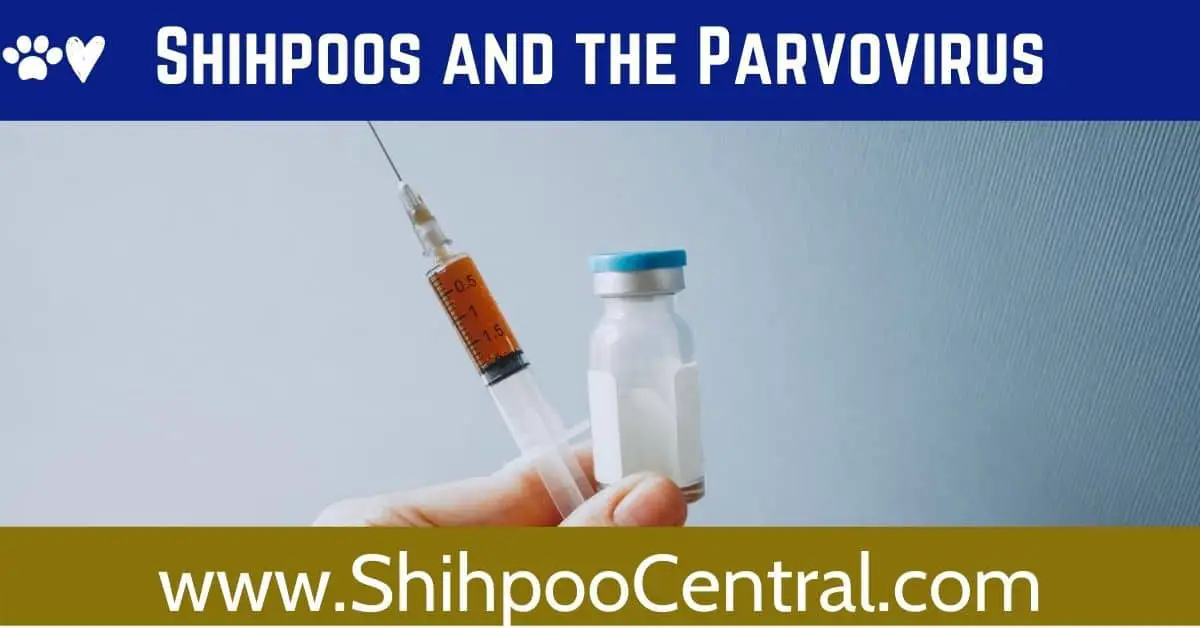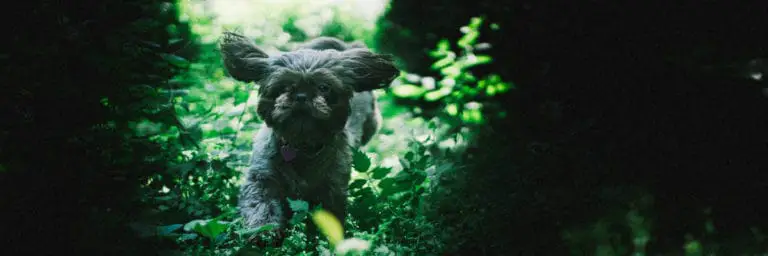Everything You Need to Know about Shihpoos and the Parvovirus
How to Prevent, Recognize, and Get Treatment for Parvo A surprising number of Shihpoo families turn to Facebook groups and other social media platforms for help because their young puppy has contracted the parvovirus. Who wouldn’t feel desperate to see their beautiful young Shihpoo puppy acting lethargic, vomiting, losing weight, and having bloody diarrhea? The…
How to Prevent, Recognize, and Get Treatment for Parvo

A surprising number of Shihpoo families turn to Facebook groups and other social media platforms for help because their young puppy has contracted the parvovirus. Who wouldn’t feel desperate to see their beautiful young Shihpoo puppy acting lethargic, vomiting, losing weight, and having bloody diarrhea? The Parvovirus, referred to regularly as just Parvo, is a serious, sometimes fatal virus that is highly preventable.
What can you do for a Shihpoo with Parvovirus?
Treatment and medications for Shihpoos with Parvovirus cannot cure the dog of the virus. Instead, they provide support for the dog’s general strength in the hope its own immune system will overcome the virus. With an early and aggressive response, survival rates approach 90%.
An ounce of prevention is worth more than a pound of cure, so new Shihpoo families should consider how a small sacrifice, mostly involving patience, made during their Shihpoo’s first two months at home while he or she gets through the most dangerous time to his immune system can save their puppy’s life… literally.
You have the cutest puppy on earth. You love how soft and furry, how hypoallergenic and non-shedding your puppy is. And you can’t show him or her off to your family, friends, or neighbors. Remember, though, the first month or two you have your puppy is not about you and what you are missing out on. It’s about what your beautiful, sweet, young Shihpoo needs, especially your protection now more than any other time in his or her life.
Age When Shihpoos Are Susceptible
Although Shihpoos are most susceptible to the Parvovirus shortly after most join their new families at eight weeks until about four months, unvaccinated Shihpoos may contract Parvovirus anytime throughout their life, even as adults.
Responsible Shihpoo breeders will advise new Shihpoo families to keep their young puppies away from public spaces. The problem is that the new Shihpoo family is so in love with their new puppy that we often don’t hear everything the breeder is telling us. We just want to get home and share this fluffly ball of adorableness with others in our lives.
Not only should you keep your Shihpoo away from other dogs while going through the series of Parvovirus vaccinations, in reality, you should keep your puppy off of any surface, natural or manmade, where other dogs have been and that has not been cleaned or disinfected… ever. This means no public parks, public sidewalks, neighborhood parks, and neighborhood sidewalks for your Shihpoo puppy. This means no grassy field at your local school, no play dates in your neighbor’s backyard, and it definitely means no visits to the local dog park.

Worse still, this direction from the breeder can create extreme hardship for Shihpoo families who live in a home where other dogs have lived previously. Even allowing your young Shihpoo out on the grass in your back yard could present a danger if the previous canine occupant had the parvovirus (which is more common that we want to believe).
Most difficult of all are Shihpoo homes where there is another dog in the home. If the older dog received his her or his Parvovirus vaccines as a young puppy and has continued to get the Parvovirus booster shots every three years, the newest puppy in the home should be safe. Otherwise, you might consider keeping your new Shihpoo quarantined from the other dog(s) until after the 16-week vaccine.
How Does a Shihpoo Get the Parvovirus?
The Parvovirus is among the most easily-transmitted diseases for dogs. Your Shihpoo may contract Parvovirus in two ways. First, your Shihpoo can get the virus from direct contact with an infect dog (usually by saying hello… sniffing the other dog’s hind quarters).
Indirectly, if an infected dog poops in an area where you Shihpoo is active, your puppy can get the virus because so much of it lives in dog poop for up to a year or so.
If you accidentally track into the house the poop of an infected dog, even your homebound Shihpoo is now at higher risk of contracting the Parvovirus. Ensure you and any children in your home keep your shoes clean before entering the home.
Other objects you bring into the home that your Shihpoo may play will should be keps clean, washed, and disinfected. This includes toys and chews.
Taking your young or unvaccinated Shihpoo to a groomer where she or he may come in contact with the virus indirectly can be a dangerous move.
Finally, Parvo can spread easily and quickly among dogs in a kennel setting, particularly shelters, where many of the puppies have not received their vaccinations as recommended.
Symptoms of Parvovirus in Shihpoos
The most common symptoms of the Parvovirus in dogs include lethargy, vomiting, diarrhea (sometimes bloody), and loss of appetite. While weight loss can also indicate a Parvo infection, Shihpoos at this age can be so small already, you might have a difficult time noticing and change in weight. Pay attention to fevers, another common Parvovirus symptom.
Some Shihpoo families describe their Parvo-infected puppy as experiencing depression. Weakness in your Shihpoo may also serve to alert you to your puppy’s potential infection with Parvo.
Diagnosis of the Parvovirus in Shihpoos
To diagnose the Parvovirus in your Shihpoo, get your puppy to the veterinarian. Your puppy’s vet will need to do blood work, combined with observation of your puppy’s symptoms. If you suspect Parvo, get your puppy to a veterinarian’s office immediately. Do not wait a single day. The sooner you can start treatment, the better the chances your Shihpoo will survive.

When you contact the veterinarian, do not hold back with your concern. Explain that you have noticed two or three symptoms (or more) that are consistent with the Parvovirus and that you need to bring your Shihpoo in for blood work immediately. If you meet any resistence at all, call another veterinarian’s office and get your puppy in the same day. Urgency cannot be overemphasized.
How do You Treat the Parvovirus in Shihpoos?
Shihpoos who contract the Parvovirus have a good chance (in the 90% range) of surviving if the family catches the illness early and pursues aggressive treatments. Unfortunately, families that delay action for two to three days may find they waited too long. The Parvovirus can lead to such dehydration so quickly that the Shihpoo may die with 48 to 72 hours after first exhibiting Parvovirus symptoms.
A veterinarian’s response to Parvovirus will typically include providing the Shihpoo plenty of liquids (known as fluid therapy) and antibiotics.
The antibiotics do not kill the Parvovirus (antibiotics, after all, attack bacteria, not viruses). However, the antibiotics protect the Shihpoo from common secondary infections that occur simultaneously with the Parvovirus since the virus attacks the bone marrow’s immune-building blood cells.
Vaccinating Your Shihpoo against the Parvovirus
The Parvovirus vaccine is actually a series of vaccines. Responsible breeders give your Shihpoo baby his or her first vaccine (including the Parvo vaccine) at six weeks of age. You then take your puppy to the veterinarian at 12 weeks of age (just under three months), and again at 16 weeks of age (about three and a half months) for the follow-up Parvovirus vaccine.
Thereafter, plan to take your Shihpoo star to the veterinarian every three years to a booster to ensure your puppy’s resistence stays strong.
Even proprierly vaccinated can contrafct the Parvovirus, although their chances are much, much lower. Still, do not take or alow your Shihpoo, vaccinated or not, to visit or play with any dog who has had the Parvovirus within the past two months.
How Your Shihpoo Will React to the Parvo Vaccine
Because the Parvo vaccine is just one of several vaccines given in a “vaccinee cocktail,” reactions to the specific Parvo vaccine are difficult to gage. However, uncommon side effects of vaccines in dogs include fever, sluggishment, loss of appetite, swelling, vomiting, diarrhea, pain around the vaccine area, and shortness of breath.
If your Shihpoo experiences or displays any of these symptoms, contact your vet immediately and get ready to take her or him to see the doctor.
How to Care for Your Shihpoo if Infected with Parvovirus
Your Shihpoo who has contracted and recovered from the Parvovirus will continue to have the live virus in her or his feces for up to two months. Keep your Shihpoo away from other dogs, as well as from areas frequented by other dogs.
Your Shihpoo will also gave a weakened immune system, meaning he or she should not play with or spend time with other dogs who are sick.
Finally, clean and disinfect your household and your Shihpoos toys and bedding. Bleach is one of the few cleaners proven to kill the Parvovirus. Use it on your Shihpoo’s toys and chews (be sure to wash before giving back to your puppy), in your puppy’s kennel, and on non-porous surfaces your puppy plans or live on.
Related Questions
How long does the parvovirus incubation period last?
Typically, the parvovirus takes anywhere from three days to a week and a half from first Parvovirus exposure to cause noticeable symptoms in your Shihpoo. However, a period of just three to four days is most common.
How long does the Parvovirus last in Shihpoos?
Once symptoms of Parvovirus appear (typically vomitting or diarrhea), the disease will usually run its course, for better or for worse, wihin about three days.






